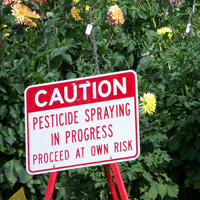Pesticides Can Lower Intelligence
Air Date: Week of April 11, 2014

(Credit: jetsandzeppelins, Flickr, Creative Commons 2.0)
New research shows prenatal exposure to pesticides can cause reduced intelligence and developmental delays similar to exposure to lead. Journalist Susan Freinkel investigated studies that charted these effects and talked with host Steve Curwood about her investigation published in The Nation.
Transcript
CURWOOD: From the Jennifer and Ted Stanley Studios in Boston and PRI, this is Living on Earth. I’m Steve Curwood. Studies that have followed children from the womb to grade school in California's Salinas Valley and in low-income housing in New York City have found that pesticide exposure can have lifelong adverse affects. When the Salinas Valley studies started, some half a million pounds of organophosphates were used there every year - farmers use less now, but pesticides are still sprayed widely. Susan Freinkel conducted an in-depth investigation of these studies and their findings for the journal, The Nation. She joins me now. Welcome to Living on Earth.
FREINKEL: Well, thanks for having me.
CURWOOD: So tell me. How were these studies conducted? First, the one in Salinas Valley.
FREINKEL: Well, they’re longitudinal studies, so in 1999 to 2000, the researchers started recruiting women, mostly migrant workers who were pregnant and who would be willing to take part in the study. And they brought the women in and they took blood samples, urine samples, from them while they were pregnant and at delivery. The New York study was looking at people who were exposed because they lived in apartments where landlords sprayed for cockroaches. This is a low-income group of people. So again, they recruited the mothers while they were pregnant, checked their blood and urine and so forth for their levels of pesticide exposure, and then as the kids were born, started following the kids both through checking their blood samples, and also following them for their developmental progress.
CURWOOD: So, what are the results here? What did these studies find in terms of the effects on these kids who were exposed prenatally to pesticides, and postnatally, I imagine, as well?
FREINKEL: Yeah, what they found, and it’s an important set of findings, is that even exposure to small amounts of pesticides has a much bigger effect than we often think. They found that the kids who had the highest prenatal exposures tended to be at much higher risk for neurodevelopmental problems, and they found this at sort of every stage where they looked at the kids. In the Salinas Valley study, at the time that the kids were six months old, the ones who had taken the highest exposure while in the womb had poorer reflexes. When they were two, that same group of kids was at higher risk for something called Pervasive Developmental Disorder, which is something akin to Asperger’s. When they were five, they were more likely to be hyperactive and have trouble paying attention. And then the finding that sort of got people’s attention was that when they were seven, the kids who had had the highest prenatal exposure, tested lower on IQ tests. They had a seven point on average lower score, which doesn’t sound like a lot on an individual level if you’re talking about one kid who’s seven points lower than another kid. Then it’s not such a big deal. But when you start to look at that on a population-wide level, it’s a huge difference. And it translates into meaning that you have as many as 50 percent increase in the number of functionally disabled adults and a 50 percent decrease in the number of gifted adults. So it’s a significant impact.
CURWOOD: Now, what are the social and economic consequences of prenatal exposure for children to these pesticides?
FREINKEL: They’re potentially huge. I talked to an environmental health specialist who had sort of calculated the effects of lead poisoning, which again, some people say, the kinds of effects are similar with pesticides. And when he looked at the economic impacts of lead poisoning, he found it cost the US $51 billion annually in lost economic productivity because what you’re talking about is, you know, everything from more kids who need special education, to fewer workers who are capable of high level complex tasks or decision-making and those sort of then ripple out through society and the economy.

A plane spraying pesticides in California (USDA photo by Charles O’Rear, Wikimedia Commons)
CURWOOD: So what are the most common pesticides that cause these issues?
FREINKEL: Well, these studies looked at organophosphates, which is a class of pesticides that ironically came into use in the 60s and 70s as a “safe replacement” for DDT. Organophosphates are not as widely used now as when the studies were launched, but the problem is that we substitute out new pesticides for the organophosphates and we don’t actually know whether the substitutes are any safer, and, in fact, some of the ones that are being used to replace organophosphates have some serious red flags around them. One is neonicotinoids, which are a class of pesticides that have been suspected to contribute the whole collapse of honeybee colonies. Another is a group called pyrethroids, and there just recently came out with a report suggesting they may be linked with behavioral problems.
CURWOOD: What can people do to change this? And what are the steps that would reduce or even prevent exposure?
FREINKEL: Well, for the people that were in these studies, the researchers have done a great job of educating them on ways they can prevent exposure, and they’re really basic things. They’re things like: take your shoes off before you go into the house, take your work clothes off, don’t hug your kids while you’re still wearing clothes you wore in the fields. For the rest of us, produce remains one of the primary ways that kids are exposed to pesticides, and the good news is here is that we can reduce our kids exposures by being more careful with the produce that we give them. Studies have shown that when you switch from conventional sprayed produce to organic produce, the level of pesticides in the kid’s bloodstream actually goes down. But you don’t even necessarily need to buy organic. You can wash produce really throughly under running water - it’s better under running water than soaking it - for a good 20 seconds, rubbing the skin with your fingers. Peel vegetables that you would normal peel. Dry it with a clean towel or paper towel. Pull away outer leaves of leafy greens which are commonly sprayed things. And eat a variety...so you’re not getting too much of any one type of pesticide.
CURWOOD: Susan Freinkel is a writer who just completed an investigation of pesticides published in The Nation. Thanks so much, Susan, for taking the time today.
FREINKEL: Thank you, Steve, for having me. It was fun.
Links
Read Susan Freinkel’s special investigation for The Nation here:
Living on Earth wants to hear from you!
Living on Earth
62 Calef Highway, Suite 212
Lee, NH 03861
Telephone: 617-287-4121
E-mail: comments@loe.org
Newsletter [Click here]
Donate to Living on Earth!
Living on Earth is an independent media program and relies entirely on contributions from listeners and institutions supporting public service. Please donate now to preserve an independent environmental voice.
NewsletterLiving on Earth offers a weekly delivery of the show's rundown to your mailbox. Sign up for our newsletter today!
 Sailors For The Sea: Be the change you want to sea.
Sailors For The Sea: Be the change you want to sea.
 The Grantham Foundation for the Protection of the Environment: Committed to protecting and improving the health of the global environment.
The Grantham Foundation for the Protection of the Environment: Committed to protecting and improving the health of the global environment.
 Contribute to Living on Earth and receive, as our gift to you, an archival print of one of Mark Seth Lender's extraordinary wildlife photographs. Follow the link to see Mark's current collection of photographs.
Contribute to Living on Earth and receive, as our gift to you, an archival print of one of Mark Seth Lender's extraordinary wildlife photographs. Follow the link to see Mark's current collection of photographs.
 Buy a signed copy of Mark Seth Lender's book Smeagull the Seagull & support Living on Earth
Buy a signed copy of Mark Seth Lender's book Smeagull the Seagull & support Living on Earth

